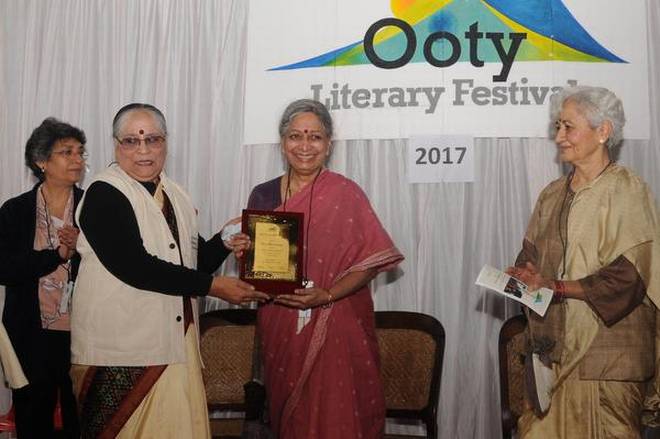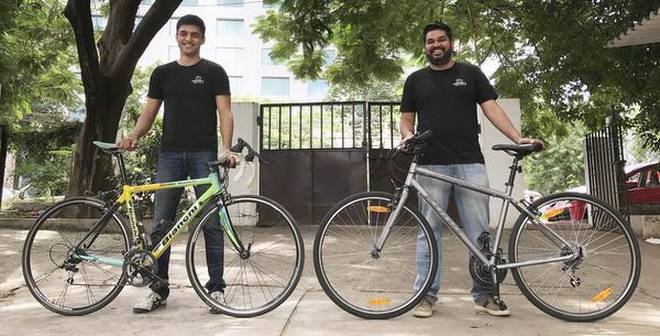
From feminism to storytelling and mythology to war, the second edition of the Ooty Lit Fest embraced the power of the word.
Amid the joy of the written word, the hues of the pages, the illustrations and publications, a sense of gravity was palpable among authors, publishers and the audience. Unsurprisingly, the second edition of the Ooty Lit Fest held in the Nilgiris Distict Library expressed concern over the growing intolerance of expressed opinions, loss of lives of journalists and free thinkers, politicisation of the media and how non-compliance was unacceptable in the present scenario. Authors and moderators in every panel discussed the importance of helping the younger generation realise the importance of compassion.
The keynote address was delivered by Padma Shri Geeta Dharmarajan, founder-director of Katha, who was also presented with a Lifetime Achievement Award. She expressed concern about the ever-widening gaps between children in rural schools and elite ones. “Stories are a great equaliser, as all children love stories, books and storytelling.” She reiterated the importance of a movement to initiate and set up community libraries with local readers and storytellers.
Twelve sessions spanning two days had authors and audience deeply engrossed in the state of the written word, new stories and folktales, myths and autobiographies. A session on Feminisms of India saw some very powerful thoughts being expressed. Authors Bama and Urmila Pawar stressed on the trials of Dalit writing while Samhita Arni focussed on mythology and how the perspectives of those stories promote male dominance and hegemony.
Bhama spoke about her autobiographical work Karukku. “I did not write with the idea of publishing. I just followed my thought process. Writing in my village dialect also happened unconsciously. I would be writing about my present when a sudden thought would take me to the past. It was like ‘sitting on a swing, moving forward and backward’. It started a new genre of writing. Many women told me that the book inspired them. All I can say is please write. Your stories have to be told; your voices have to be heard.”
Samhita Arni had two books on display: Sitas’s Ramayana and The Missing Queen. While the first is a graphic novel for children, the other questions gender bias and double standards in society. “How we tell our stories shapes the beliefs of the next generation,” said Arni. Arni thinks our stories must instigate children to question gender, caste divisions and unfair practices. “It is important to look for stories told through the oral traditions in indigenous societies. You will find so much variety with local beliefs and interpretations. That is how I wrote Sita’s Ramayana.” The book is a collaboration with Moyna Chitrakar, a scroll painter in the Patua folk art tradition. The art of scroll painting, was restructured to the graphic novel format and Arni wrote the text.
An interesting dialogue with Gopalakrishna Gandhi titled “A look at the literary vehicles of our freedom struggle” brought home the fact that books are not the only vessels of thought. We need to take into account the songs, newspapers reports, especially those of publications like Swadesamitran, Mathrubhumi, and Mook Nayak. When asked about the books that shaped his thoughts, he warned, “No book should become a Bible. Just read it with its strength and weaknesses.” In another session, author Vithal Rajan said, “I searched for stories about the role of the Indian Army in World War II or all the battles that the British fought and discovered that all leadership roles and victories led by Indian army soldiers were deliberately left out of the documentation by the British. However, they do exist in the homes of the soldiers.” He called for NGOs and historians to look at the possibility of documenting these stories and bringing them into public arena to fill the gap of 500 years of Indian valour during the British Rule.
Dharmarajan said, “At Katha —with various partners like CRY, Amazon, His Holiness The Dalai Lama, and others —we are re-introducing the Each One Teach One concept in urban schools. When children learn to teach another child, there is empathy, compassion, sharing of knowledge which lays a strong foundation for future society.”
Vanamala Viswanatha, Visiting Professor at the School of Education, Azim Premji University, Bengaluru, took the stage in the last session titled “Gamaki and the Life of Harishchandra”. She has translated Harishchandra Kavyam written by Raghavanka. Using the Gamaki or kaavya vachana, a form of storytelling that involves singing as well, she moved the audience to tears with her beautiful rendering of the story.
“We want to keep the festival small, cosy and intense,” said Geetha Srinivasan, one of the. “Jerry Pinto, our advisor, helped us to connect with the authors and formulate the sessions. The Fest wishes to attract new authors, unheard voices and authors who write for a cause. May be we will have a fest of women authors only…and may be one for children as well. We are lucky to have the Nilgiris District Library, which inspires us to conduct more such events.”
Referring to Viswanatha’s session, Srinivasan added, “We must possibly think of having this kind of a session from a different language and culture each year. It strikes a chord and brings back to the forefront values that are important and all but forgotten.”
Lives of Dalit women
Urmila Pawar’s Marathi autobiography Aaidan (The Weave of My Life: A Dalit Woman’s Memoirs) weaves the stories that she heard into her story. The name Aaidan is derived from the Marathi word for basket. She chose the name because her mother was a basket maker and also because the lives of different members of her family, her husband’s family, her neighbours and classmates “are woven together in a narrative that gradually reveals different aspects of the everyday life of Dalits and the manifold ways in which caste asserts itself and grinds them down.”
Translation woes
Mini Krishnan — Editor Translations at Oxford University Press — moderated a session called The Translator, The Translation and The Translated. “The importance of a good partnership that a translator must have with the author and the publisher cannot be over emphasised,” she said. “The translator must understand the emotions and the nuances of languages and the characters, translate, send to the author a few times till author is satisfied that the meaning is right. There are times when the trust is so high and things go well. There are many a translation work that has failed when the relationship and trust never manages to establish.”
Vanamala Vishwanatha talked of the difficulty when the text is an epic or classic and there is no author to consult. In such case, the partnership with language experts, historians and research become important guides to ensure that the translation remains true to the original. Bama recalled how her book was translated into French without checking with her and how it was in total contradiction to what she had written.
source: http://www.thehindu.com / The Hindu / Home> Books / by Archana Dange / September 18th, 2017
